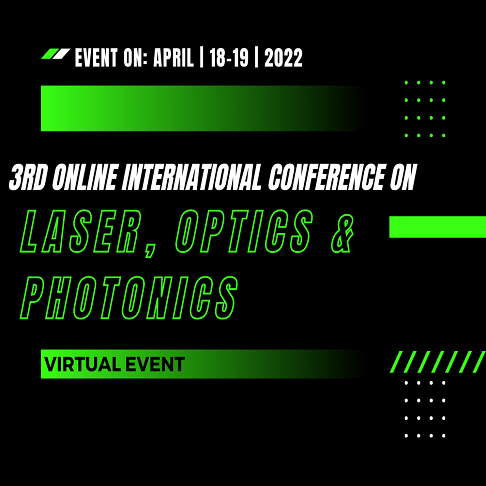Coalesce Research Group is privileged to invite you to participate in our 3rd Webinar on Laser, Optics & Photonics with the ongoing theme: “Exemplifying the Prominence of Lasers, Optics and Photonics in today’s world” scheduled on April 18-19, 2022. It is designed to serve as a virtual online platform for the speakers to showcase their highly insightful research work, knowledge from the field of Laser Optics and Photonics to the audience and participants. In this peak time of struggle, our aim is to bring global scientists/researchers and students to one platform to share updated information, Innovation and compliance towards Laser Optics and Photonics.
Present your Research work online by staying at your home! Join us now to seize this opportunity and we believe your work would add an interesting segment to the program.
The conference includes Keynote and Plenary Sessions, Speaker Sessions, Young Researcher Forum, Workshops, Symposia, Video Presentations, Poster presentations, E-Posters, Exhibitions, and an opportunity for B2B meetings on the most recent improvements in the field of Laser, Optics & Photonics, Quantised Light-Matter Interaction, Nano-optics and Metasurfaces, Nonlinear Photonics.
Targeted Audience
- Quantised Light-Matter Interaction
- Lasers
- Biophotonics
- Nano-optics and Metasurfaces
- Lasers in Defense Systems
- Ophthalmology
- Nonlinear Photonics
- Microwave Photonics
- Quantum Integrated Optics
- Topological Photonics
- Quantum Photonics
- Laser Cosmology & Astrophysics
- Atom Optics
- Quantum Thermodynamics
- Optical Coherence Control
- Photonic Systems
- Fiber-Optic Waveguide Devices
- Optofluidics
- Non-Linear and Ultrafast Optics
- Photonics in Artificial Intelligence
- Satellite Communications Systems
- Microwave Engineering
- Space Photonics
- Optics and Biophysics
- Laser Science and Technology
- Optics and Lasers in Medicine
- Integrated Optoelectronics
- Photonic Integrated Circuits and Systems
- Atto Science
- Novel Laser Technologies and their Applications
- Nanophotonics and Photonic Crystals
- Photonic Materials and Metamaterials
Guidelines For Speakers
- Keep the number of slides in your Presentation to a minimum and follow the assigned slots.
- Please stop when signalled to do so by the Chair.
- Personal laptops should not be used unless in any unavoidable conditions.
- The Videos will be recorded.
- Question Sessions, thanks and acknowledgement of the speakers will take place during the session or after completion of the session, so please stay until the end of the session.
Guidelines For Poster
- Each poster should be approximately 1x1 M in Size The title, contents, text and the author’s information should be clearly visible even from 1-2 feet.
- Present numerical data in the form of graphs, rather than tables.
- If data must be presented in table-form, keep it Simple to be easily understandable.
- Visuals should be simple, clear and bold. Avoid acronyms and mathematical notations as much as possible.
- Posters with 800-1000 words or less are perfect.
- Avoid submitting compactly packed, highly worded- count posters.
- Categorize your poster into subdivisions, e.g., Introduction, Methods, Results; Discussion, Conclusions, and Literature Cited.
- Use bright colors to enhance the better visibility Besides your project, you can also include future research plans or questions.
Opportunities for Conference Attendees
For Researchers & Faculty
- Speaker Presentations
- Poster Display
- Symposium hosting
- Workshop organizing
For Universities, Associations & Societies
- Association Partnering
- Collaboration proposals
- Academic Partnering
- Group Participation
For Students & Research Scholars
- Poster Presentation Competition (Winner will get Best Poster Award)
- Young Researcher Forum (Award to the best presenter)
- Student Attendee
- Group Registrations
For Business Speakers
- Speaker Presentations
- Symposium hosting
- Book Launch event
- Networking opportunities
- Audience participation
For Companies
- Exhibitor and Vendor Booths
- Sponsorships opportunities
- Product launch
- Workshop organizing
- Scientific Partnering
- Marketing and Networking with clients
Abstract Peer-review Process/Guidelines
- The Reviewing Committee of Conference ensures high-quality peer review process for all abstracts submitted.
- The decision of abstract acceptance will be judged by a panel of experts emphasizing whether the findings and / or conclusions are novel and make useful contributions to the field.
- The committee operates a single / double-blind peer review process for all the abstracts submitted, where both the reviewer and the author remain anonymous.
The following are the steps that each abstract of Conference undergoes during the process of peer review.
- All submitted abstracts are reviewed by internal editorial team to ensure adherence to the conference scope and abstracts which have passed this initial screening are then assigned to the session chair / review committee for evaluation.
- Once the reviews have been received, the review committee decides to accept or reject a manuscript, or to request revisions from the author in response to the reviewers’ comments. If the decision tends to be minor revision or major revision, authors will be given 14 days to resubmit the revised abstract.
Criteria to be considered for Scoring.
The abstract should be reviewed according to the following criteria:
- Originality of concept/approach and level of innovativeness
- Significance/impact/relevance to conference theme
- Quality of research design/theoretical argument
- Conclusions and interpretations of results
Presentation style: Coherence and clarity of structure


